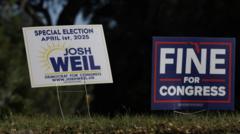As President Biden prepares to leave office, his legacy is overshadowed by shortcomings, low approval ratings, and a political landscape dominated by his predecessor. This analysis dives into the internal conflicts and miscalculations that contributed to the current state of his administration.
The Fallout of Biden's Presidency: A Legacy in Limbo

The Fallout of Biden's Presidency: A Legacy in Limbo
Examining the challenges and missteps that marred Biden's presidency, revealing infighting, strategic errors, and the specter of Trump.
Standing at a podium in Washington’s National Cathedral last Thursday, Joe Biden delivered a moving eulogy for former President Jimmy Carter while other former presidents, including Bill Clinton, George W. Bush, Barack Obama, and Donald Trump, looked on. This somber occasion highlighted a stark reality: each of his fellow presidents successfully gained the American people's validation through re-election, a feat that has eluded Biden. In his tribute to Carter, Biden remarked, "Many think he was from a bygone era, but in reality, he saw well into the future," reflecting on Carter's enduring legacy in civil rights, environmental protection, and peace initiatives.
However, as his presidency nears its conclusion, Biden's own legacy appears precarious. With only 39% of Americans holding a favorable view of him, according to Gallup, he leaves office amid discussions about his achievements and failures. Despite significant accomplishments such as passing complex investment bills, supporting NATO expansion, and appointing a diverse range of judges, voters remain skeptical, viewing his tenure as a mere intermission between two Trump presidencies.
The chaos of the Kabul withdrawal in August 2021 marked the beginning of Biden’s tumultuous journey as president. While the exit had been arranged by the Trump administration, the turmoil that ensued reflected poorly on Biden. His approval ratings plummeted below 50% at that point and never recovered. Concurrently, inflation escalated, with American sentiments souring despite improvements in economic conditions.
Domestically, Biden's administration struggled to address surging inflation rates and the influx of undocumented migrants at the southern border. Compounding these issues were various crises, including shortages in essential goods and rising prices, contributing to an overall perception of incompetence from his administration.
The internal dynamics of Biden's inner circle proved problematic as well, becoming increasingly insular and prone to infighting over time. While the first half of his presidency was marked by legislative successes, the subsequent period saw a decline in effective communication and public messaging. This growing insularity may have hindered the administration’s ability to connect with a weary electorate suffering from sustained economic anxieties.
Despite his intentions to run for a second term, Biden faced ongoing scrutiny regarding his age, memory, and ability to effectively lead. His formal campaign announcement heralded warnings about the danger Trump posed to American democracy, yet critics questioned the narrative employed by Biden and his aides.
As the clock ticks down to a crucial election, Biden's presidency is marred by numerous challenges, including the ongoing fallout from the Gaza conflict and familial distractions surrounding his son Hunter. The culmination of these factors resulted in a poorly received debate performance against Trump, cementing doubts about Biden's capabilities leading into the electoral season.
As the nation prepares for a new presidential tenure, Biden's tenure will likely be evaluated through the lens of missed opportunities and a fluctuating public opinion. Some argue that the Democrats should have prioritized a transition of power rather than sticking with Biden, ensuring a smoother succession in leadership.
Ultimately, Biden’s struggle underscores the ongoing tensions within American politics, as he leaves office, confronting the aftermath of decisions made during his time in power. Looking forward, the effectiveness of Trump's reinstatement will play a critical role in shaping Biden's historical standing. As Attorney General Merrick Garland noted, “I'll leave that to the historians,” reflecting the uncertain nature of how history will remember Biden’s presidency.






















